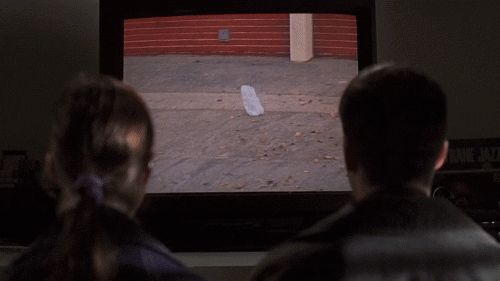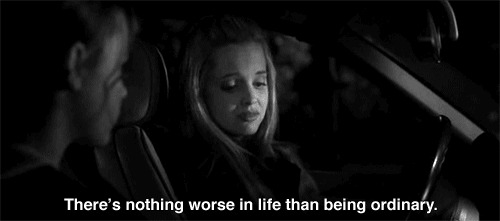The Bluestocking, vol 90: Plastic bags and true regrets
Happy Friday!
I've been enjoying the traditional pre-party-conference season cold, which I look forward to sharing with as many people as possible from Sunday in Liverpool.
Just three links this week, although I would also recommend this brutal review of Francis Fukuyama's Identity, and my friend Adam's therapeutic pop at dodgy evolutionary psychology.
Wish me luck.
Helen
Sam Mendes Works Like A Sculptor
“The most difficult thing when you have early success is to keep yourself open,” Mendes said. “Actors see directors work all the time. Directors see precisely no directors at work.” In 1989, he took himself to Berlin to sit in on the rehearsals of Peter Stein, the director of the Schaubühne Theatre. The experience was eye-opening. “I think I labored for a long time under the pressure of trying to prove to everyone that I was fair and democratic,” Mendes said. Stein would walk up to actors and speak the lines and make the gestures alongside them. Sometimes he would stand behind them and lift their arms into the postures he wanted. “What was amazing is they just carried on. It didn’t break their concentration,” Mendes said. “It’s much more dictatorial than I would ever attempt, but it did teach me not to be afraid of it. Sometimes what you need to be is prescriptive.”
I trailed this piece on Twitter, noting with a sad roll of the eyes that it begins with Mendes tracing a lineage of directors whose great moments have inspired him: "Kurosawa for the death of the king at the end of “Throne of Blood,” Martin Scorsese for panning a camera down an empty corridor in “Taxi Driver,” Joel and Ethan Coen for the last scene between Marge and Norm in bed at the end of “Fargo”. There were two-dozen-odd, and they were all men. That bias is not something I blame Mendes for - some of my best friends are male directors - but it is still a depressing indictment of the history of cinema, which is really the history of men's cinema.
Anyway, I'm always bang up for a John Lahr theatre profile, and this one particularly piqued my interest because I bid for Mendes myself ahead of the Lehman Trilogy. (Can't imagine why he went with the New Yorker instead...) Here's my question: do you think John Lahr thinks Sam Mendes is any good? He calls him the "master showman" of British theatre (which itself could be a sly cuss) then says his "emotional and analytic intelligence, swiftness, and command are more or less unrivalled". But Lahr never really shows, rather than tells, you why Mendes is supposed to be admirable. And he never finds a Mendes moment to compare with Scorsese's corridor pan or Christopher Walken's watch speech. I suspect the obvious contender would be the paper bag in American Beauty, but I also suspect I had different standards in the 1990s and that would come off as howlingly pretentious if I rewatched it now. (I also wonder if Kevin Spacey's pervy dad viewpoint would seem troublingly conflated with the audience's.)
Is there a great Mendes moment? Hit reply and tell me. People who nominate Literal Riverdance from The Ferryman, or the bit where Judi Dench NEEDLESSLY SWITCHES ON HER TORCH, YOU DAFT WOMAN, TURN IT OFF FOR GOD'S SAKE in Skyfall, will be removed from the mailing list.

No wonder people switched to Netflix
Why Did the New York Review of Books Publish That Jian Ghomeshi Essay?
"The reason I was interested in publishing it is precisely to help people think this sort of thing through. I am not talking about people who broke the law. I am not talking about rapists. I am talking about people who behaved badly sexually, abusing their power in one way or another, and then the question is how should that be sanctioned. Something like rape is a crime, and we know what happens in the case of crimes. There are trials and if you are held to be guilty or convicted and so on, there are rules about that. What is much murkier is when people are not found to have broken the law but have misbehaved in other ways nonetheless. How do you deal with such cases? Should that last forever?"
As an editor, sometimes you might PUBLISH a career-ending interview. It's kinda rarer to give one. And yet that seems to be what Ian Buruma of the New York Review of Books did here, when he talked to Slate's Isaac Chotiner about his decision to publish "Reflections on a hashtag" by the Canadian public figure Jian Ghomeshi. Buruma has since resigned from the NYRB.
Ghomeshi was accused of sexual assault by more than 20 women. He was acquitted on some charges, and another was dropped after he apologised and signed a "peace bond". Weirdly, Buruma seems quite sketchy on the exact allegations against his writer, which seems to me like the first thing you would really investigate before publishing such an essay. (On the Woody Allen case, for example, I think it's possible that the situation is much more complicated than the simple narrative allows. Essentially, the Farrow children differ on what happened: Dylan and Ronan on one side, Moses on the other.)
But allowing Ghomeshi to obfuscate on the nature of the allegations and his response to them creates a toxic impression that this piece is a self-indulgent wallow in self-pity; that's not helped by the personal essay format, which renders the entire rest of humanity as bit-players in Ghomeshi's terrible trauma. It doesn't make him look better, frankly.
Would I have published his piece? No. It's not interesting enough to warrant the platform. To compound the offence, the NYRB front cover wrapped in Ghomeshi's essay with a (very good) piece by Arlie Russell Hochschild on "left behind men" and one by another writer, all under the rubric "The Fall of Men". In concert with the dismissive reference to a "hashtag" in the Ghomeshi sell, that made the whole effort look like "feminism has gone too far, hasn't it?".
Also, Jon Ronson's So You've Been Publicly Shamed covers the same ground, but does it a) by reporting on people accused of far less serious misconduct, and b) with more attention paid to the perspectives of people other than the accused. What I would like to read is an interview with Ghomeshi conducted by someone as forensic as Isaac Chotiner of Slate.

Well, there speaks someone who hasn't been to a fringe event at Labour party conference
I Believe Her
I told no one. In my mind, it was not an example of male aggression used against a girl to extract sex from her. In my mind, it was an example of how undesirable I was. It was proof that I was not the kind of girl you took to parties, or the kind of girl you wanted to get to know. I was the kind of girl you took to a deserted parking lot and tried to make give you sex. Telling someone would not be revealing what he had done; it would be revealing how deserving I was of that kind of treatment.
Caitlin Flanagan's story is notable both for showing how far our ideas about sexual assault have come in a single lifetime, and for offering something remarkable: the prospect of forgiveness. Her attacker apologises to her.
I know so many women in similar situations, where it would mean so much to them just to have the person who attacked them acknowledge what they did, and acknowledge it was wrong. Otherwise, you have to carry around the pain of being disbelieved, your narrative of your own life being up for debate, as well as all the other scars.
"It felt good to get the apology and—as it always does—even better to forgive him. He’d done a terrible thing, but he’d done what he could to make it right. I held nothing against him, and I still don’t."

Same.

